GALLUP NEWS SERVICE
PRINCETON, NJ -- The latest corruption scandal brewing on Capitol Hill can't be good for an institution already suffering from low public approval ratings. Recently released details in an FBI search warrant suggest that Louisiana Rep. William Jefferson may be the latest in a string of congressmen to have been caught trading their influence for personal financial gain. A similar scandal brought down California Rep. Randall "Duke" Cunningham last fall.
The type of corruption that came to light last year with the indictment of Washington lobbyist Jack Abramoff is perhaps more serious. It involves explicit quid pro quo between lobbyists and lawmakers, where legal gifts and donations may have been traded for specific votes or other legislative action.
Now, with Congress' overall approval rating at 21% and approaching the all-time record low of 18% recorded in 1992, the House ethics committee recently agreed by a bipartisan vote to proceed with investigations into Jefferson as well as a Republican House member linked with Abramoff. Clearly members of both parties feel pressure to take action, but is it enough?
How serious do Americans perceive the problem to be?
As the Jefferson case unfolds -- he says he's innocent, and the case is on hold pending an investigation into the FBI search of his House office -- a key question is whether Americans will view it as just an isolated case of a corrupt individual seeking personal gain, or as evidence of a systemic problem in the halls of Congress that is poisoning the business of government.
Until now, it seems that Americans have absorbed the news of government corruption in stride.
Only 39% of Americans surveyed in an April 2006 poll said corruption in Congress is a "very serious" problem. Taken at face value, this is not a big number. Another 44% called the corruption somewhat serious, while 17% dismissed it as not serious.
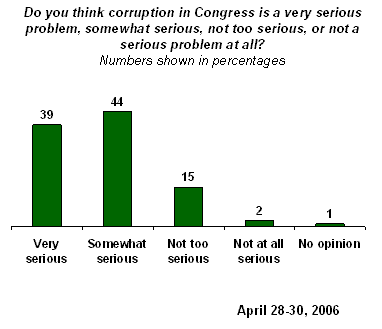
The percentage believing most members of Congress are corrupt is not much different today than it was 12 years ago. In October 1994, 50% said most members were corrupt. Today that figure is 47%. Over the same period there has been a slight decline, from 27% to 22%, in the percentage saying their own House member is corrupt.
About two-thirds of Americans (65%) currently say that most members of Congress are more focused on the needs of special interests than on the needs of their constituents. However, today's figure is only marginally higher than the number accusing Congress of such malfeasance in 1994.
What do Americans want done?
The same April poll found 64% of Americans saying the corruption issue in Congress should be a high priority for Congress to deal with, including 15% who say it should be "the top priority."
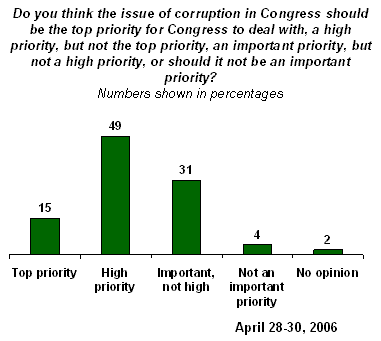
However, when explicitly asked by Gallup about each issue, a January poll found a smaller percentage of people rating corruption in government as "extremely important" for the president and Congress to deal with (45%) than said this of the situation in Iraq (58%) or terrorism (57%). Corruption essentially tied with healthcare policy (47%) and the economy (46%) on this list, and at the time exceeded immigration (31%).
Perhaps more telling is the more recent finding from late May that only 2% of Americans mention corruption (or issues related to dissatisfaction with government) spontaneously when asked to name the most important issue for Congress to deal with right now. The situation in Iraq swamps these results, named by 42% of Americans, while the energy issue garners 29% and immigration 23%.
Americans may want to see Congress take some action on corruption, but they are skeptical Congress will make momentous changes. Just 4% of Americans say they have a great deal of confidence in Congress to pass meaningful legislation to deal with the issue of corruption in Congress. Only another 28% say they are fairly confident this can happen, while 68% have little or no confidence.
According to one recent Gallup measure, Americans themselves are not seeking radical solutions. When asked in April whether the better way to address political corruption is through more disclosure of lobbyist activities, or a complete ban on lobbyist perks like gifts, meals or travel, only 52% favored a full ban; nearly as many (47%) said full disclosure would be enough.
How will the issue play out in the upcoming midterm elections?
In January, about 4 in 10 Americans said that corruption in government would be an extremely important issue to their vote for Congress this year. This ranked corruption at the top of the list of issues rated, along with Iraq, terrorism, and healthcare, and higher than Social Security, taxes, and immigration.
But whether the Republican majority will be targeted this fall for blame over corruption isn't clear. Americans are readily partisan on almost every substantive issue facing Congress. Given this, plus the fact that the Abramoff scandal is thus far entangling more Republican than Democratic members of Congress, it is perhaps surprising that Americans are generally bipartisan in assessing government corruption today. Overall, 76% say the series of corruption scandals involving government officials over the past year have involved both parties equally. This includes 68% of Democrats and 74% of Republicans.
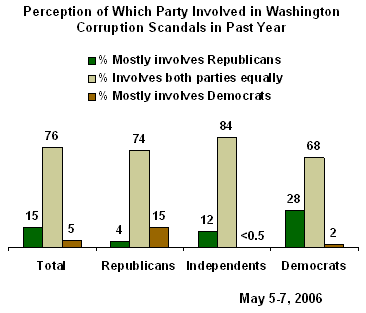
As of December 2005, there was virtually no difference in Americans' estimates of the number of members of each party in Congress that are corrupt. The majority minimizes the extent of the problem in both parties: 54% said only a few or no Democrats were corrupt and 51% said the same of Republicans. Again, there was relatively little difference in these evaluations according to respondents' party identification.
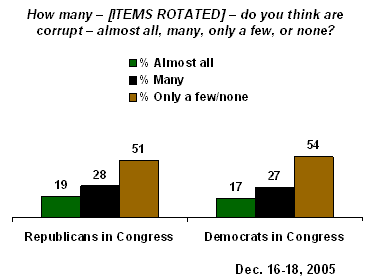
While Republicans have thus far been no more likely than Democrats to be tagged as corrupt, they do trail the Democrats in perceptions of which party would do the better job of dealing with the issue (41% choose Democrats, 29% Republicans). However, the large percentage making no distinction between the parties on this measure (30%) leaves less than half favoring the Democrats.
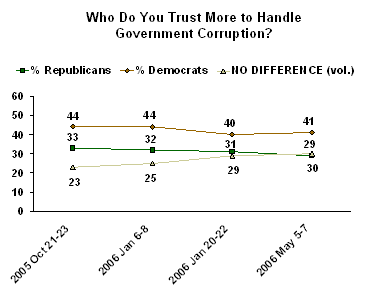
Survey Methods
These results are based on telephone interviews with randomly selected national samples of about 1,000 adults, aged 18 and older, conducted Dec. 16-18, 2005, and April 28-30 and May 5-7, 2006. For results based on this sample, one can say with 95% confidence that the maximum error attributable to sampling and other random effects is ±3 percentage points. In addition to sampling error, question wording and practical difficulties in conducting surveys can introduce error or bias into the findings of public opinion polls.